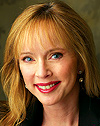 At age 24 , British author Martin Amis débuted with his comic novel The Rachel Papers. Nineteen books and umpteen story collections followed, plus two high-profile marriages, five children, and enough international gossip to make Paris Hilton weep. Now this 57-year-old “bad boy of English letters” has morphed into one of the most celebrated living British authors, a niche once occupied by his father, Sir Kingsley Amis, who died in 1995. Amis-the-Younger’s newest novel, House of Meetings, is already burnishing his reputation: an unconventional love story, it’s set in the bleakest locale imaginable-a 1940s Soviet labor camp. Victoria Lautman interviewed Amis, who had recently returned to London from an extended South American sojourn.
At age 24 , British author Martin Amis débuted with his comic novel The Rachel Papers. Nineteen books and umpteen story collections followed, plus two high-profile marriages, five children, and enough international gossip to make Paris Hilton weep. Now this 57-year-old “bad boy of English letters” has morphed into one of the most celebrated living British authors, a niche once occupied by his father, Sir Kingsley Amis, who died in 1995. Amis-the-Younger’s newest novel, House of Meetings, is already burnishing his reputation: an unconventional love story, it’s set in the bleakest locale imaginable-a 1940s Soviet labor camp. Victoria Lautman interviewed Amis, who had recently returned to London from an extended South American sojourn.
|
|
Q: Congratulations! The London Observer ranked your novel Money (1984) second on a recent list of “best British novels of the last 25 years.” Pleased?
A: I was delighted and honored, although I’m not sure I agree it was my best novel. I might have put in Time’s Arrow.
Q: Oh? That’s a better book?
A: Actually, it’s like your opinion of your children: they’re all equal, but sometimes you’re more into one than the other.
Q: Wasn’t Money the novel your esteemed father read, and then accused you of “buggering about with the reader”?
A: Yeah! He read the first chapter and liked it, but then sent the book spinning across the room when he saw I was in it as a character. He hated postmodernism. He liked firm reality in his books, and he had a more orderly idea of reality than I do.
Q: As for House of Meetings, one British reviewer suggested that, after writing Koba the Dread (2002) and a heap of essays on the subject of Soviet slavery, you were now approaching obsession with the topic. Are you obsessed?
A: I’ll tell you what: I’d be very surprised if I wrote any more about Russia. I had a very difficult, terrible time writing this. But now I understand it was a struggle for the legitimacy to be able to write about the topic, not so much as fiction, but as a point of view. I couldn’t experience ten years of penal servitude; all I could do was the suffering in my study.
Q: This is your first novel since Yellow Dog (2003), which garnered the worst reviews of your career . . .
A: . . . and my family and I spent two years in Uruguay, so we were away from all that. Though I admit it was a horrible experience. In this country it wasn’t just the reviewers but anyone who could hold a pen, spouting real hatred and venom, just horrible and disgusting. It was much worse than being attacked personally. It was more like watching your child being scragged.
Q: House of Meetings was written in Uruguay?
A: Yes, and that also caused a bit of trouble. We lived on the edge of the ocean in a pretty house with my beautiful wife and adorable daughters. And there I was trying to write about Soviet slavery above the Arctic Circle! But in the last month of writing, I finally felt good about it. And when I read the proofs I was very impressed that I’d come through, and had actually written a novel.
Q: The references to Chicago will tickle Midwestern readers. Was this in honor of your mentor and surrogate father, Saul Bellow?
A: It’s a slight lacuna: it could have been anywhere. But I had enough feel for the city and it was where I met Saul and spent time with him. It’s his city, anyway. Saul owns Chicago.
Critical Mass
Noteworthy new releases for January
|
|
Besides car chases through the Loop, what elements constitute a homegrown crime thriller? Chicago inspected the prose of first-time local novelists Marcus Sakey (TheBlade Itself; St. Martin’s Minotaur) and Sean Chercover (Big City, Bad Blood; William Morrow), both débuting in January. In addition to tackling Chicago’s seedy underbelly, Sakey and Chercover contribute to a crime fiction blog, theoutfit collective.com.
Gratuitous violence . . .
|
|
“Suns exploded behind Danny’s eyes as the force of the punch lifted him off the ground . . . A steel-toed boot slammed into his kidney, and he jerked to his side, at once gasping for air and gagging viciously.” (Blade)
“I rolled over and grabbed the bottle and swung blindly. The heel of the bottle caught him on the chin and I heard his jaw break and he was down and out.” (Big City)
Saintly love interest . . .
“Despite the impossible mess that had become his life . . . as Karen put her head on his chest Danny felt strangely safe.” (Blade)
|
|
“We first met in the emergency room at Rush Presbyterian. She was a nurse and I was a guy with a black eye, a broken nose and two cracked ribs.” (Big City)
Tension-filled denouement . . .
“He felt a hot flash of panic in his bowels as he dangled by one hand. His shoulder screamed and his sweaty fingers slowly began to slip.” (Blade)
“I was in the backseat of a car. Bound and blindfolded.” (Big City)
–Brigid Sweeney
Photography: Lautman – Marc Hauser, Amis – Isabel Fonseca






